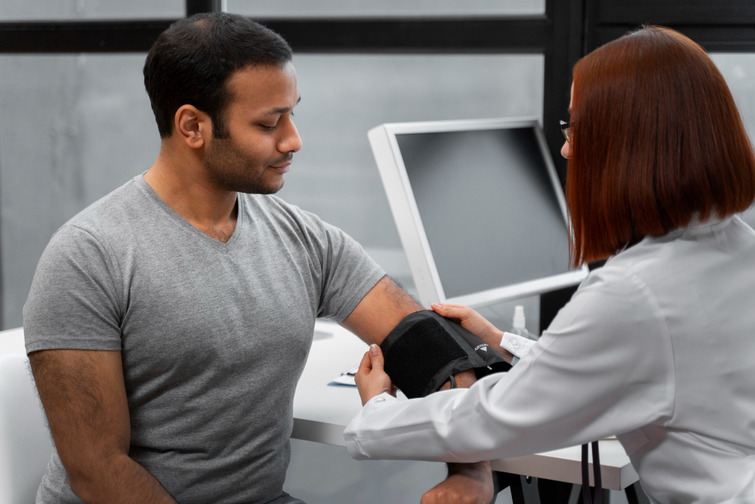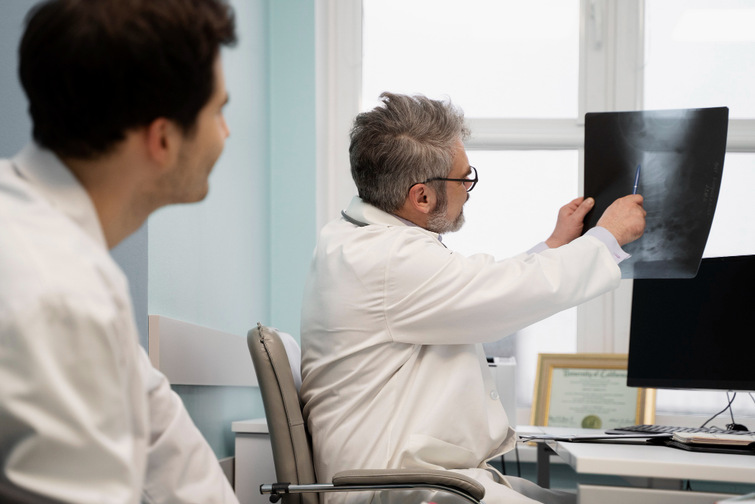
Regular health screenings are a cornerstone of preventative medicine, helping to identify risks and conditions before they develop into serious health issues. A trusted primary care doctor in Bridgeport, CT, emphasizes the importance of timely screenings tailored to individual health profiles and local health trends.
Here are ten key health screenings everyone should include in their health routine.
Key Takeaways
Introduction
Why Regular Health Screenings Matter
10 Health Screenings You Should Take
Frequently Asked Questions (FAQs)
✓ Blood pressure monitoring must be checked annually to prevent heart disease and stroke.
✓ People aged 20+ should have their cholesterol level checked every 4-6 years to prevent heart disease.
✓ Blood glucose tests are important for diagnosing and managing diabetes. They are recommended every three years starting at age 45.
✓ Screenings for common cancers (breast, colon, prostate) are vital and should be based on age, gender, and risk factors.
✓ Bone density scans are recommended especially for postmenopausal women and men over 70, to detect osteoporosis early.
✓ BMI assessments help evaluate weight-related risks and should be part of regular health check-ups.
✓ Regular vision and hearing tests should be conducted every two years to maintain quality of life.
✓ Testing for thyroid function is recommended if symptoms like fatigue or weight changes are present.
✓ Liver function tests are advised for individuals at risk of liver diseases to detect issues early.
✓ Regular skin checks are crucial for early skin cancer detection, particularly for those with high sun exposure or family history.
Regular health screenings recommended by a local primary care doctor in Bridgeport, CT, are critical for maintaining and improving health outcomes. These screenings involve various tests and evaluations designed to catch potential health issues before they develop into serious conditions.
Here’s a more detailed look at each benefit:
Many severe health conditions and diseases, such as cancer, diabetes, and heart disease, have better outcomes when caught early. Regular screenings can identify these conditions in their early stages, often before symptoms are apparent, enabling earlier and often less invasive treatment options that can be more effective than those initiated after the disease has progressed.
Screenings help your primary care doctor in Bridgeport, CT, detect existing conditions and identify risk factors that might predispose one to develop a particular health issue. This knowledge allows both the patient and the doctor to implement lifestyle changes or treatments to prevent these risks from developing into actual health problems. For instance, detecting pre-diabetes early can lead to dietary adjustments and increased physical activity to prevent the onset of full-blown diabetes.
Early detection and prevention strategies can significantly reduce healthcare costs. Treating a disease in its early stages is typically far less expensive than managing complications or advanced stages of diseases. This is beneficial not only for the individual but also for the healthcare system as a whole, reducing the overall economic burden of healthcare.
Regular health screenings help local primary care doctors in Bridgeport, CT keep patients’ health stable by allowing timely adjustments to treatments. For instance, in diabetes, frequent blood sugar tests can prompt necessary changes to prevent severe complications like kidney damage. Similarly, monitoring blood pressure and cholesterol in heart patients can reduce the risks of heart attacks and strokes. These screenings are essential for maintaining health and improving quality of life.
Catching health problems early can help you sidestep serious complications later on, paving the way for a longer, healthier life. Regular check-ups and screenings play a critical role in this process, ensuring that any emerging health issues are addressed promptly. This proactive approach not only keeps you in good health but also contributes to a better quality of life as you age.
Regular health check-ups can significantly ease the mind of anyone concerned about potential health issues. Knowing you’re regularly monitored by a trusted primary care doctor in Bridgeport, CT, not only helps catch any early signs of illness but also reassures you that you’re taking proactive steps toward maintaining your health. This ongoing care and vigilance can significantly reduce feelings of anxiety and stress, which are often triggered by the unknown aspects of one’s health status.
Regular health screenings do more than just keep you healthy — they’re a crucial tool for community health management. When you participate in these screenings, you’re contributing valuable data that your primary care doctor in Bridgeport, CT, can use to identify health trends and challenges specific to your area.

Staying on top of your health is crucial, and regular screenings are a key part of that process. Here are essential health screenings recommended by local primary care doctors in Bridgeport, CT that can help you detect potential health issues early, manage existing conditions effectively, and lead a longer, healthier life.
Blood pressure screenings are a routine part of any visit to your primary care doctor in Bridgeport, CT. Hypertension, or high blood pressure, is a major health concern that affects nearly 45% of adults in the US. Unmanaged high blood pressure can quietly damage your body for years before symptoms develop. If left unchecked, it can lead to several serious health problems, such as heart disease, and stroke. kidney damage, vision loss, and arterial damage. Your primary care doctor in Bridgeport, CT, recommends screening at least once every two years for adults over 18, or annually if previously elevated readings have been noted.
Here are the key risk factors associated with hypertension:
Cholesterol checks are crucial for identifying high levels of cholesterol in the blood, which can lead to the buildup of plaques in arteries, increasing the risk of heart disease and stroke. For individuals at average risk, primary care doctors in Bridgeport, CT, recommend a lipid panel every 4-6 years. This test measures levels of various types of fats in the blood, including LDL (bad cholesterol) and HDL (good cholesterol).
People with additional risk factors may need more frequent cholesterol screenings. These risk factors include:
Screening for blood glucose levels helps your primary care doctor in Bridgeport, CT, detect early signs of diabetes. Early detection can lead to better management and control of diabetes, preventing complications. Certain conditions and lifestyles increase the risk of diabetes and may necessitate more frequent blood glucose tests. These include:
Cancer screenings are a crucial aspect of preventive health care. For individuals at higher risk, such as those with a family history of a particular cancer or genetic predisposition, your primary care doctor in Bridgeport, CT, recommends earlier or more frequent screenings. Additionally, lifestyle factors such as smoking, diet, and physical activity can influence the type and frequency of screenings suggested.
Common types of cancer screenings include:

Osteoporosis leads to brittle bones and fractures. A bone density scan is recommended by your primary care doctor in Bridgeport, CT, for women over age 65 and men over 70. However, individuals with risk factors for osteoporosis might need to begin these screenings earlier.
Risk factors include:
BMI screenings by your primary care doctor in Bridgeport, CT, can identify weight issues that increase the risk of chronic diseases. This simple calculation should be part of any routine health evaluation. A high BMI can indicate a higher risk of conditions such as heart disease, diabetes, and certain cancers. Conversely, a very low BMI might suggest malnutrition, osteoporosis, or other health issues.
Indicators of Health Risks:
General Tips for Reaching a Healthy BMI:
Regular vision and hearing tests, recommended by your primary care doctor in Bridgeport, CT, ensure any decline can be managed promptly. Adults over 60 should have annual screenings. However, those with a family history of vision or hearing problems, or those who have had significant exposure to loud noises, might need more frequent screenings.
Importance of Early Detection:
Thyroid issues can impact metabolism and energy levels. Your primary care doctor in Bridgeport, CT, will recommend screening every 5 years starting at age 35, or sooner if symptoms are present. However, screenings should be more frequent if symptoms like fatigue, unexpected weight gain or loss, or changes in heart rate are observed. Additionally, those with a family history of thyroid issues may also need earlier and more frequent testing.
Importance of thyroid screenings:
Liver health is crucial for overall wellness. Your primary care doctor in Bridgeport, CT, suggests these tests every year if you use alcohol, have a history of liver disease, or use medications that can damage the liver. Here are the key risk factors for liver diseases that might necessitate regular testing:
Skin cancer is the most common form of cancer. Annual checks by your primary care doctor in Bridgeport, CT are recommended, especially if you have any of these key risk factors:
Health screenings should start as an adult, but specific ages for certain screenings can vary. Generally, routine screenings like blood pressure and cholesterol should begin in early adulthood, around age 20, or when recommended by your primary care doctor in Bridgeport, CT.
Preparation can depend on the type of screening. Fasting may be required for blood tests. It’s best to wear comfortable clothing for physical exams. Always bring a list of your current medications and any symptoms or concerns to discuss with your primary care doctor.
Yes, in addition to the general screenings, women should have regular cervical cancer screenings (Pap tests) starting at age 21 and mammograms starting at age 40, or earlier based on individual risk factors.
While a healthy lifestyle can reduce risk factors, it does not eliminate the need for health screenings. Screenings are crucial for early detection of conditions that may not present immediate symptoms.
Most preventive health screenings are covered under the Affordable Care Act, often without a copay, even if you haven’t met your deductible. Check with your local primary care doctor in Bridgeport, CT, to understand what is covered under your plan.
Ready to take charge of your health? Schedule your appointment today with Doc Primary Care – Bridgeport and let your trusted primary care doctor in Bridgeport, CT, guide you through the 10 essential health screenings you need for a healthier tomorrow. Don’t wait — your well-being is our priority! Call now or visit our website to book your consultation. Your journey to optimal health starts here!



During this surge in COVID-19 cases, our primary focus is meeting the high demand for tests, and we are seeing higher than usual wait times. This means we are unable to answer most phone calls. Please know that our teams are working very hard during this time to care for as many patients as safely as possible. Please click the button below for answers to common questions. We appreciate your understanding.